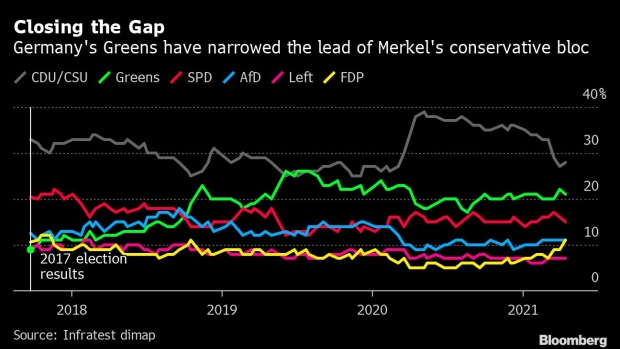Apr 20, 2021
Laschet Wins Race to Lead Merkel’s Conservatives in German Vote
, Bloomberg News

(Bloomberg) -- Armin Laschet clinched the nomination to run for German chancellor for Angela Merkel’s conservative bloc, ending a messy standoff that threatened to damage the country’s strongest political force.
Laschet, the head of Merkel’s Christian Democratic Union, becomes the favorite to lead Europe’s biggest economy following September’s election after fending off Markus Soeder from the CDU’s smaller Bavarian sister party. Soeder, who waged in insurgent challenge, conceded on Tuesday after a clear vote by the CDU’s leadership backing Laschet.
“The dice have fallen, Armin Laschet will be the chancellor candidate” of the conservative alliance, Soeder said, adding that he’s called Laschet and congratulated him.
By picking the 60-year-old moderate, Germany’s conservatives are foregoing Soeder’s greater electoral appeal and making a potentially risky bet that Laschet will be able to lift his flagging poll numbers, even as the Greens close in.
While Soeder, 54, has much more support among voters, rejecting Laschet less than three months after he was picked as leader of the CDU would have created a whole new set of problems -- including destabilizing the party hierarchy and undermining its campaign in North Rhine-Westphalia, Germany’s most populous state, where Laschet is premier.
The fact that Germany’s dominant party wound up in such a mess with just five months to go to polling day is a testament to its struggle to move past 66-year-old Merkel, who has governed for 16 years and dominated the CDU for a generation.
While it’s still on track to be the biggest party in the next parliament in the latest polls, the CDU/CSU is heading for its worst-ever result in a federal election and is facing a challenge by the Greens to become Germany’s strongest force. That leaves Laschet with little time and little margin for error.
Annalena Baerbock, a 40-year-old political scientist and foreign-policy expert, was named the Greens’s first official chancellor candidate on Monday. She claimed the mantle as the candidate for change and took issue with the “mudslinging” in the conservative bloc.
“Trust in democracy, in politics as a whole is threatened,” she said. “I stand for renewal. Others represent the status quo.”
An initial effort to hand over the reins to Merkel protege, Annegret Kramp-Karrenbauer, was undermined by a series of missteps and then the process of selecting a replacement was delayed by the Covid-19 pandemic. Laschet was elected in January and promptly suffered bruising defeats in elections in former conservative strongholds. That opened the door for Soeder, who fought tooth and nail to prevent his rival from settling the debate, potentially doing lasting damage to the bloc’s image.
Laschet will need to reclaim the conservative’s reputation as the anchor of German stability. He won the candidacy mainly for his consistency in contrast to Soeder’s reputation for flipflopping and opportunism.
The son of a coal mining foreman, Laschet graduated in law, once edited a Catholic newspaper and was a legislator in the Bundestag as well as the European Parliament before being elected leader of Germany’s most populous state in 2017.
He will likely continue Merkel’s centrist policies as well as her low-key style of leadership, if he wins in September and can form a ruling coalition. Yet he will inherit a raft of new challenges, ranging from overcoming the coronavirus pandemic to managing a transition to green technology and tackling the threats posed by China and Russia.
“Ranks are closing behind Armin Laschet,” Roderich Kiesewetter, a CDU lawmaker, said in an interview with ZDF television on Tuesday. “We now have to look forward” and turn attention to the campaign.
©2021 Bloomberg L.P.


